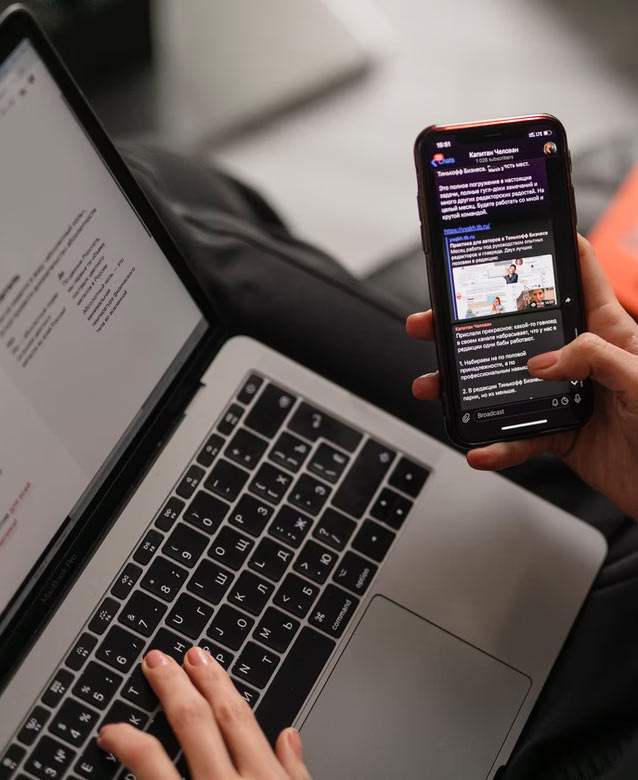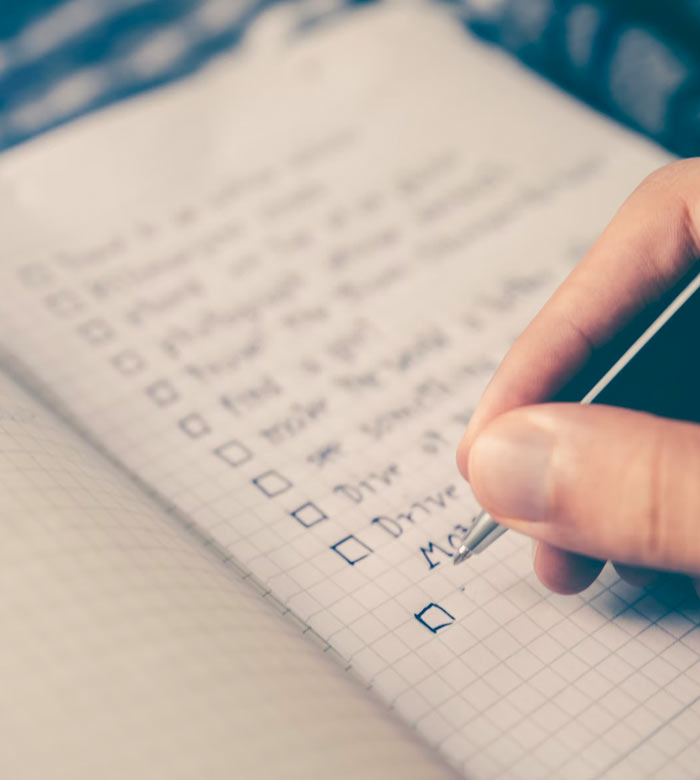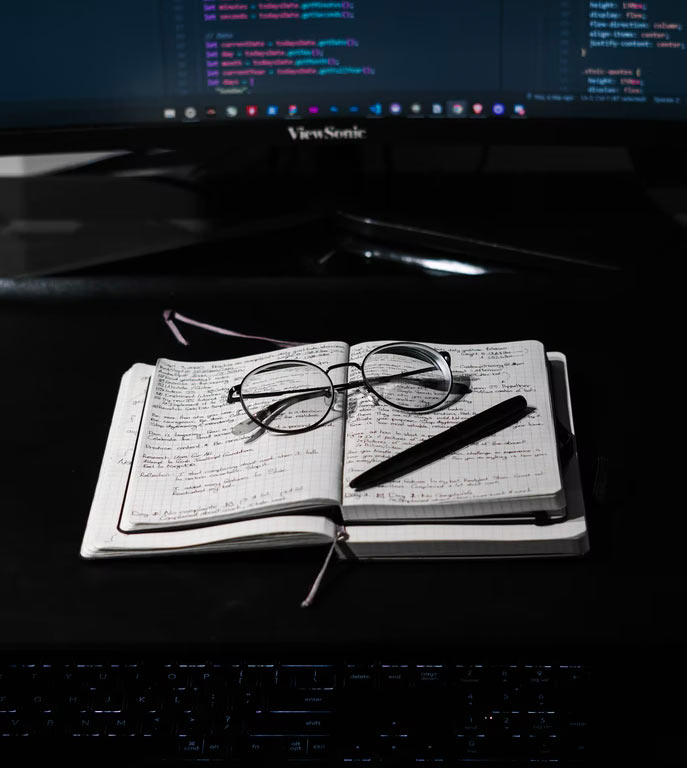It's easy to forget that we weren’t always so connected. Most of us can't imagine giving up our phones and going back to the way we lived before, and some of us don't even notice how much time we spend looking at screens.
Is the way most people use the internet today a form of addiction? It certainly seems to have a negative impact on our mental health, but the act of disconnecting also threatens to cause problems. How many of us check our phones the moment we wake up just in case something important has happened? There’s social and perhaps even economic pressure to be connected that’s not easy to defy.
Life is busier online. Instead of thinking about the handful of things relevant to our immediate environment each day, we think about hundreds of distant things we can’t affect.
People are more interested than ever in practicing mindfulness and simpler living. But how can you use the internet as a tool rather than having it rule your life?

1. Give technology its time and place
You can decide to spend less time looking at your phone, but without a more specific goal it’ll be hard to know if and when you’ve been successful.
One way to make a noticeable impact is to restrict technology to certain times of day. For example, make sure you disconnect from all devices one or two hours before going to bed. Try activating flight mode or leaving your phone in a different room when you sleep.
Your sleep quality will improve, boosting your motivation to keep going.
The next stage is to avoid using your phone in the first hour or two after waking up, too.
The reason this works is biological. Our brains chemically get ready for bed at night, and for the day ahead when we wake up. These are our two most sensitive moments. Social media and LED screens interfere with our bodies’ ability to naturally regulate mood and wakefulness.
We can even go further and track daily screen time. If you know precisely how many hours a day you look at your phone, you can make an informed decision about whether you’re using that time like you want to be.
There’s no correct answer to the question of how many hours a day you should be connected. What matters is that you’re the one in control.
Rather than trying to radically change your behaviour overnight, you could aim to reduce your average screen time gradually over a matter of weeks.
To fully engage yourself in this process, you might track your progress by using colouring pencils to fill in squares of graph or dot grid paper, setting up one axis as days and the other axis as the amount of screen time each day. You could either use a different colour for each day, or use more intense colours as the daily time increases.
If specific apps are troublesome, your phone’s wellbeing tools might let you limit how long you can use them for. It sounds farcical but just putting small obstacles in the way of opening an app can remind you of your intention and make you think twice. What’s more, being limited to 15 minutes per day on social media will motivate you to make the most of that time.
Finally, some phones can be set up to display in grayscale at certain times of day. Vivid colours contribute to habit-forming behaviours so this can help make absent-minded scrolling less appealing.
2. Commit to genuine relaxation and real excitement
Sometimes we pick our phones up because we’re bored.
If you gave someone a modern smartphone in 1999, it would blow their mind. The amount of content available and the speed and fidelity of everything would’ve been unbelievable 20 years ago.
We’re used to it. If you eat sugar all the time you need more of it to taste the sweetness. What should feel like an intense experience is normal for us. Some of us even think it’s relaxing.
That means we get bored more easily. We think nothing of absent-mindedly scrolling through social media after a long day of work or play. We treat it the way we used to treat TV, and before that radio. But unlike those older channels of connection to the world, your phone isn’t on in the background. It’s in your face.
You have to rediscover both excitement and relaxation.
Part of that means allowing yourself to feel the sensation of boredom without rushing to chase it away. For some people, meditation is a particularly effective way to reset the baseline. In any case you have to find ways to relax more completely. Reading a book in print is infinitely better than watching the 24/7 news cycle unfold on a screen. You might also try drawing mandalas, taking long walks or going to museums or galleries.
The other side of the equation is to do things that are more engaging than scrolling. Creating art, stepping out of your comfort zone, playing sports and visiting nature are a few ways to elevate your heart rate mindfully.


3. Reset your boundaries so you’re not always expected to be online
It’s helpful to bear in mind that your technology habits don’t start and end with you. There are external pressures that pull us online.
One problem with checking your phone frequently is that friends, family and work grow accustomed to quick responses. This can be a tough pattern to break, as some people might interpret a change in behaviour negatively.
The way to mitigate this is to tell people about the change you’re making and your motivations for doing so. Then you can reset their expectations, for example telling your boss that you’ll only see emails during established work hours.
There’s a balance to find here. Disconnecting completely can feel like falling out of sync from important parts of your life. As an alternative to activating flight mode, you might switch off WiFi and data and let everyone know that they have to call you in an emergency.
4. Write letters and have phone calls with friends
We’re accustomed to having almost everyone in our lives no more than a text message away.
It does allow us to be more social, but it also robs us of a certain kind of depth. The pace of messaging means that we quickly forget what has been said, and we often speak quickly without putting in much thought.
Disconnecting might feel like growing distant from loved ones. But it can be an opportunity to do just the opposite. Phone calls are a way to offer each other your full attention within a dedicated window of time.
Letters are even older and deeper. When you write by hand, you think about your words slowly. Slow thinking is itself a tool of introspection and relaxation. A letter is really a small work of art dedicated to your recipient. You don’t need to be a good writer or have neat handwriting to get started, but if you make a habit of it you’ll certainly get better at both.
Letter-writing has a majestic power. Your recipient will probably consider your words carefully and take them seriously.
Not to mention it’s extremely fun.


5. Dedicate your attention to one thing at a time
Modern life pulls our attention in multiple directions at once.
We’re used to cycling between different activities which all seem to demand our attention. On a computer, it’s normal to have many browser tabs open, but studies have suggested that browser tabs make us worse at thinking.
The quiet, slow moments of life, instead of feeling relaxing, often feel uncomfortable. We’re not used to being alone with our thoughts, and we worry we’ll miss out on something important. Even an activity like watching a tv show can fail to hold our attention. We want further stimulation and will quickly unlock our phones just to check.
Incoming notifications produce a chemical rush that we hardly register, but unconsciously pursue. All of this contributes to a vicious cycle of anxiety and poor attention. To escape it, you have to give each experience your undivided attention.
That means deciding how you’ll spend your time and sticking to it.
It can be tempting to make to-do lists, especially if you feel like your life and thoughts lack structure. But to-do lists are often counterproductive. They can sink us deeper into the unexamined belief that there are 100 important things we ought to think about. Quantity takes precedence over quality - and that’s reflected in a desire for more possessions, more relationships and more experiences, at the expense of our current ones.
Instead, it can be helpful to plan your day ahead the evening before. Don’t overdo it. Make sure to leave plenty of time to do things that are not ‘productive.’ You might even pencil in some dedicated time for social media, which will make it easier to resist compulsively checking throughout the day.
You could also do a braindump - get all the worries, ideas and pending decisions that pester you onto a page. Then label about 80% of them as ‘not important right now.’ Trust your brain to alert you if they become important again in the future, at which point you can return to the braindump. Instead of making a list of things to worry about, you’re making a list of things you promise not to worry about.
6. Find analogue alternatives for everyday functions
It’s convenient having one device that can do so many jobs for us.
But the truth is phones don’t fulfil half of those functions as well as the traditional alternatives. At the very least, we’re missing out on tactile and aesthetic experiences that would add depth and meaning to everyday rituals.
When a beautiful object does one job and does it well, it’s natural to be present in the moment when you interact with it. Whenever you unlock your phone to do the same job, you’re immediately presented with 100 other possibilities for things to think about.
If you find yourself checking the time often, the chances are you’ll find it rewarding to wear a watch. If you take a lot of photos, it’s infinitely more fun to use a film or instant camera - and you’ll notice the pictures feel more meaningful. If you like cooking, get yourself a nice kitchen timer, and if you absolutely need an alarm to wake up in the morning, a sturdy old analogue alarm clock will give you something pleasant to touch that you won’t associate with the stress of the previous day.
But the best transformation of all is to go from relying on a note-taking app to having a real physical notebook you can treasure. If you don’t know where to begin, you might try bullet journalling. If you already use paper but keep going back to the phone, it might be time to try a new system.


7. Use journaling to think more clearly
Generally speaking, thinking is a private activity. Sometimes we even hide our thoughts from ourselves. Many spiritual traditions, from the third century desert monks of Egypt to modern mindfulness meditation, all emphasise slowing down so you can pay closer attention to your own thoughts.
Our distant ancestors would have had to make maybe one or two significant decisions per day. They probably wouldn’t have found it difficult to slow their thoughts down.
By many criteria, we’re freer and more comfortable now. We have a lot more information, so you could certainly make the case that we are ‘more intelligent,’ at least by our own standards. But maybe we’ve lost some peace of mind. We are constantly receiving vivid mental images, perhaps hundreds of them in a matter of hours.
All that mental processing can be exhausting, and it leaves little space for us to lead our inner lives. Whenever we’re online, we’re being influenced so quickly that we probably don’t notice most of our own reactions, let alone contemplate and understand them.
When we absent-mindedly scroll social media, we’re in a confusing grey area between solitude and socialising. We’re thinking, but we’re powerless to order and focus our thoughts.
Putting pen to paper is a different kind of thinking. First of all, you have to slow down your mental sentences - especially if you put effort into writing neatly. Secondly, you will be confronted with your own commentary. These thoughts don’t instantly disappear into the void, displaced by the next attention-grabbing image. They remain on the page.
Keeping a journal creates a space for your inner life. When you write in it, you can find solitude and independent thought, which then frees up social time to be more fully social.
Technology itself isn’t the problem
Changing your technology habits can be a gradual and challenging process. You might set some initial goals and then fail them. That’s good. That means you’re attempting to do something difficult.
In the process, you’ll become mindful. Perhaps you’ll find that you can keep using social media most days, without it having a negative impact or taking over your life.
Maybe we can stay connected, but be in control.